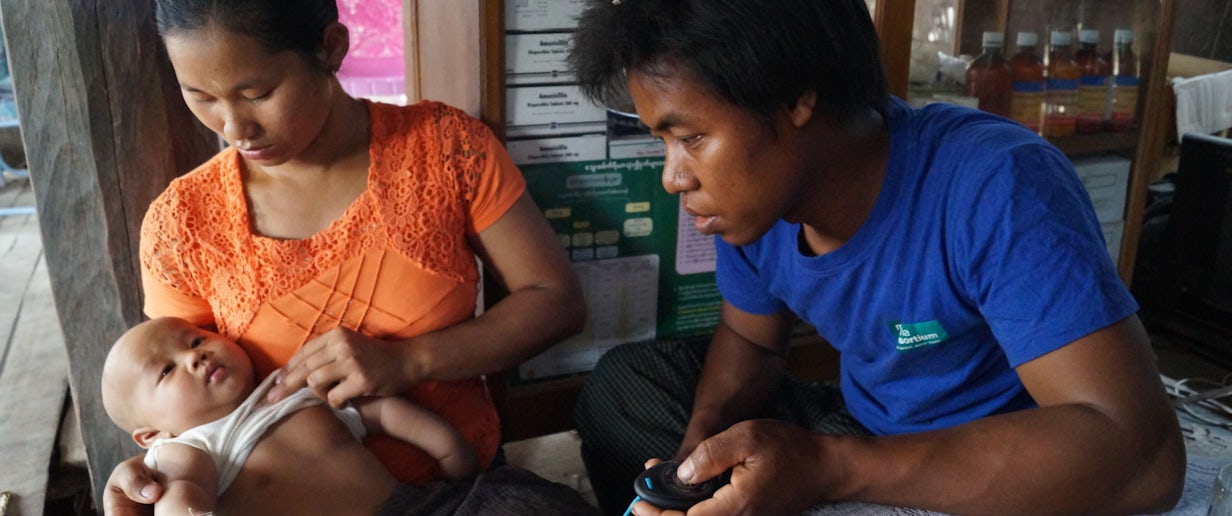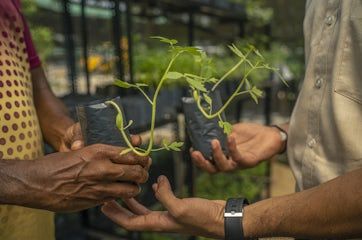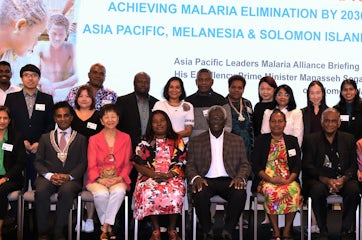Strengthening Cross Border Collaboration For Malaria Endgame
by APLMA •

Malaria volunteer sits with mother and young child, iCCM Myanmar
Strengthening Cross Border Collaboration For Malaria Endgame
On July 27th, the South East Asia Regional Coordination Mechanism Forum (SRCMF), chaired by Dasho Kunzang Wangdi, Global Fund (GF) Board Member for Asia Pacific organized its 4th Virtual meeting to accelerate malaria elimination program in the region and respond to challenges brought by COVID-19 pandemic.
The SRCMF is a platform of governments, the private sector, and organizations working to end HIV/AIDS, tuberculosis, and malaria from 11 countries in the region to collaborate and voice concerns to the Global Fund Board. The 11 countries include Bangladesh, Bhutan, Democratic People’s Republic of Korea, India, Indonesia, Maldives, Myanmar, Nepal, Sri Lanka, Thailand, and Timor-Leste. For this convening, the constituency focused on national malaria elimination activities with a strong emphasis on cross-border collaboration.
Cross border malaria is a major impediment to achieving regional malaria elimination. No country can achieve this goal in isolation. As we move closer to ending malaria, accelerated efforts are needed to address border malaria.
As the Asia Pacific region approaches elimination, the remaining cases often reside along international borders, in areas that are harder to reach. Near eliminating countries such as Bhutan, Nepal and Timor-Leste share borders with high burden countries India and Indonesia respectively, which are a constant source of imported malaria. It is more critical now than ever to actively focus on strengthening cross border malaria elimination efforts to timely address issues of imported cases, outbreaks, drug and insecticide resistance, to ensure sustained elimination.
“Cross-border communities are the most high-risk population – poverty, hard-to-reach terrains and difficultly to access health care makes them the most vulnerable. To effectively address cross-border malaria we need to focus on: sub-national level strategies, galvanizing political will, multiparters resource mobilization efforts and community engagement." - Dr. Suriya Wongkongkathep: CCM Thailand
APLMA CEO, Dr Sarthak Das addressed the inaugural session by highlighting the importance of cross border collaboration in achieving the regional goal of malaria elimination by 2030. Dr Das highlighted the successful cross-border efforts between French Guiana and Brazil , focusing on harmonising and sharing data on cross-border malaria epidemiology through an online monitoring platform. The development of the joint cross-border surveillance system, to make comparable and qualified data available to all the parties involved in malaria control between French Guiana and Brazil, has shown potential to help in informing new scientific evidence on cross-border malaria dynamics and implementing cross-border cooperation for malaria control and elimination.
Dr Das highlighted three important learnings from the French Guiana and Brazil cross-border setting which can be applied to the cross-border context in Asia pacific:
- Sharing data through innovative platform eg: building cross-border malaria information system (CBMIS) is needed
- Centrality of multidisciplinary partnership including data science, information systems, epidemiology, parasitology, geography, and geomatics, to ensures adoption and translation of cross-border solutions into practice and ensure targeted and coordinated public health responses from both countries in order to achieve malaria elimination.
- Health Diplomacy and Political Will: Setting up Joint Commission for Cross-Border Cooperation
Lastly, Dr Das reiterated APLMA-APMEN secretariat’s commitment to continue working with partners in the region to ensure continued political commitment and fiscal support for cross border malaria elimination efforts.
Dr Kamini Mendies: Advisor- SRCMF, highlighted the importance of leadership, multilateral, and bilateral partnerships to support national malaria programs tackling border malaria. In addition to this, she also highlighted the need for a common platform where all the partners can come together to address cross-border issues, particularly ensuring effective allocation of resources. She suggested that SRCMF, along with APLMA can effectively take up this role of bringing together partners and national programs of the region for cross border collaboration, based on an agreed framework for monitoring and evaluation.
During the open floor discussion session, the members highlighted the need of district and provincial level strategies to ensure effective implementation at ground level – where the issues lie. It was collectively agreed to consider districts/sub national bordering areas as unit of measurement of impact of cross-border activities and collaboration efforts.
Country representatives from Indonesia, Thailand, Maldives and Sri Lanka presented on status of COVID-19 Pandemic, its impact and mitigation on malaria program in cross border area. The country speakers highlighted the following issues.
- Disruption of malaria services, including distribution of LLINs, due to shift in focus to address COVID-19 situation.
- Surveillance is heavily affected, especially active case detection, follow ups.
- Resurgence in certain areas due to relaxation in surveillance.
Representative from member states of Bangladesh, Bhutan, India, Nepal and Timor Leiste presented on “Cross border issues on malaria elimination address adequately/inadequately/ does not address by the National Strategic Plan (NSP)”. As presented by the speakers, all the countries have acknowledged the issue of border malaria in their National Strategic Plans and have some strategies in place to address the issues. However, the speakers highlighted that the following gaps in their current efforts to effectively address border malaria:
- Lack of joint data sharing platform/mechanism
- Lack of coordination/collaboration at the provincial level
- Lack of joint implementation strategies
Cross-border malaria surveillance is very important, especially now when we are so close to elimination”. – Dr Kamini Mendis, Advisor- SRCMF
In the concluding discussion, the members highlighted the following key action items for SRCMF and other partners in the region:
- Establishment of coordinating mechanisms between various partners in the region and malaria programs at national and sub-national level to maximize input and resource allocation
- Establishment of joint cross-border surveillance mechanism- platform/online dashboard
- Advocate for increased political commitment to ensure ownership at the country level.
As a regional secretariat working towards strengthening collaboration between countries, APLMA-APMEN is committed to continue to advocate for 1) increased political and fiscal commitment for cross border efforts. 2) strengthening of national and provincial level coordination and collaboration 3) joint implementation of harmonised cross-border malaria elimination activities.





